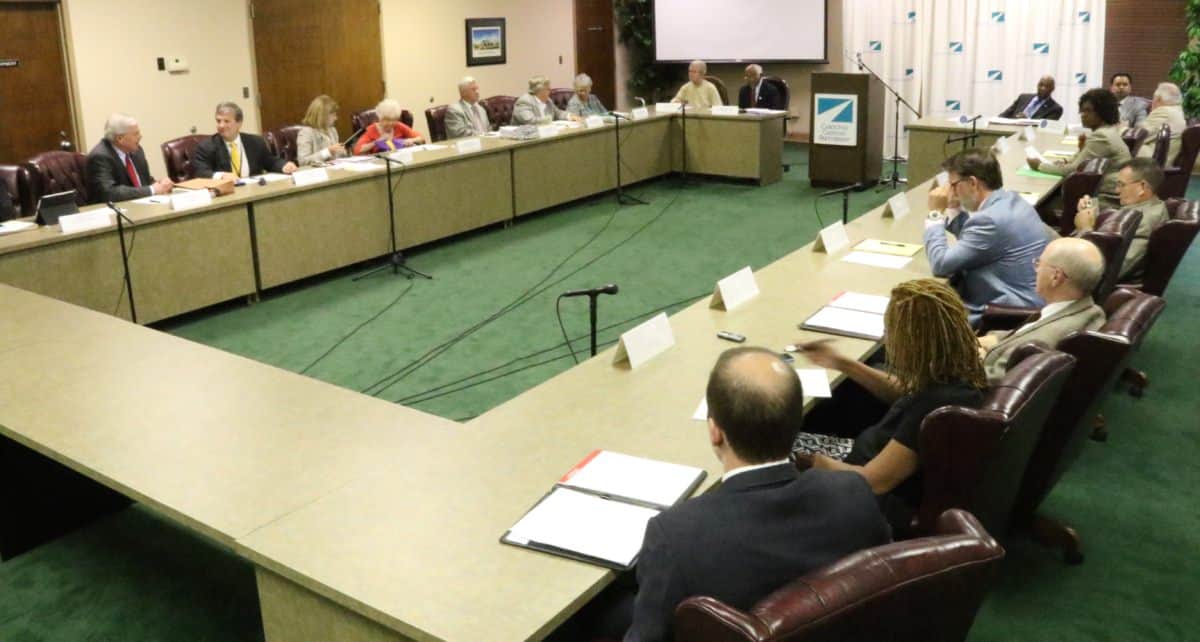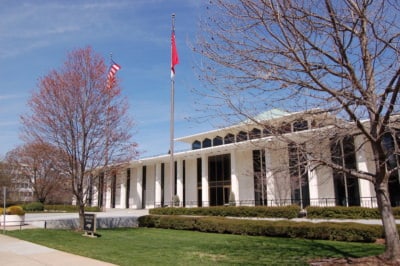The Boards of Commissioners from Nash and Edgecombe Counties came inches away yesterday from hammering out an agreement that would halt plans to dissolve the school merger between Nash County and the City of Rocky Mount.
The two sets of Commissioners agreed on the main point of contention — ending “gap” payments being made by the City of Rocky Mount for 2,000 students from Edgecombe County who attend Nash-Rocky Mount Schools. But the two Boards stopped short of actually voting on any proposal, choosing instead to meet in subcommittee together on Wednesday to hammer out a final agreement.
“For goodness sake, don’t let anybody derail it,” said Fred Belfield, chair of the Nash County Commissioners. “Because if it’s derailed again, I can tell you what you’re going to get.”
The “what” he’s referring to is the split up of Rocky Mount’s schools along county lines.
The back story is this. Back in 1992, Nash County and the City of Rocky Mount merged their respective school systems by legislative decree. The City of Rocky Mount, however, is partly in Edgecombe County. Part of the agreement was that those children — about 2,000 — would attend the merged school district. But, Edgecombe County had to pay the local per-pupil funding for those students. It’s local allotment for those costs was, and remains, lower than the local per-pupil allotment for the Nash County students attending Nash-Rocky Mount Schools.
Edgecombe officials felt they couldn’t raise the allotment for only those students attending the merged district without raising the allotment for all students in Edgecombe County schools, something they could not afford to do. As a result, the City of Rocky Mount picked up the “gap.” It pays the extra money required for the Edgecombe County students in its merged school district to give them the same local per-pupil funding as the kids from Nash County.
Some Nash County Commissioners object to this and have been seeking to undo the merger — which would split the schools in the City of Rocky Mount along county lines and send 2,000 kids into Edgecombe County schools. The Nash Commissioners voted in April to pursue legislation to achieve this goal.
Some on the Edgecombe side suspect there is a racial element to this battle, according to Edgecombe County Schools Superintendent John Farrelly.
“There is a lot of talk in the community about race being a primary driver of the agenda,” he said.
When Rocky Mount and Nash originally merged their school systems, it resulted in the dismissal of a federal desegregation lawsuit that the Rocky Mount Board of Education had filed against the Nash County Board of Education.
Farrelly says 61 percent of students in the city of Rocky Mount are African American, and 95 percent of the 2,000 students that would enter Edgecombe County schools are African American. According to data from the Department of Public Instruction, in 2015-16, Nash-Rocky Mount Schools has 8,105 African-American students and 5,002 white students. At that level, African Americans make up about 51.7 percent of the entire student population. White students make up about 31.9 percent. With 1,900 fewer African-American students in its schools, Nash County Schools’ student population would fall to about 39.6 percent African American. Farrelly says the additional 2,000 students would take Edgecombe Schools African-American population from 62 to 70 percent.
Monday, Eric Evans, Edgecombe County’s manager, presented to the Nash County Commissioners Edgecombe’s proposal to preserve Nash-Rocky Mount Schools. The proposal had been sent in advance to Nash Commissioners to review.
It basically consisted of two points. Edgecombe County would agree to take on the “gap” expenses being paid by Rocky Mount in the 2020-21 fiscal year and forever after. It would also agree to pay a proportionate amount of capital expenditures for the Nash-Rocky Mount school system — basically a proportion of funds that would be based on the number of Edgecombe students in the merged school system and would go to pay for new schools, additions, renovations, etc.
After Evans presented, Belfield passed around a different proposal worked up by the Nash Commissioners. This one still had the capital expenditures part. It also ends gap funding completely by 2020-21. However the Nash proposal phases that in — reducing the amount paid by Rocky Mount each year by 25 percent until the city is paying none of the gap and Edgecombe is paying all of it.
The Edgecombe Commissioners balked at the proposal since they had never seen it before yesterday and the county’s attorneys hadn’t had a chance to look at it.
“You had time to at least look over our proposal,” said Leonard Wiggins, chair of the Edgecombe Commissioners, adding later. “I don’t think I can ask our board to approve something they have not read.”
Jonathan Felton, the vice chair of the Edgecombe Commissioners echoed that sentiment.
“We’ve had no access whatsoever to this,” he said. “It’s like we’re still playing games.”
The Nash Commissioners pointed out that the proposal had only been finished earlier in the day.
Edgecombe officials also seemed leery of some of the lesser provisions contained in the proposal. Take a look at the Nash Commissioners’ proposal here.
Edgecombe Commissioner Billy Wooten jumped in to try to soothe tempers. He pointed out that the two Boards agreed to most of the major points. They just had a few items left that needed to be discussed.
“I believe that we’re so close to the edge of making this happen,” he said.
Finally, the two sides agreed that on Wednesday at 10 a.m., subcommittees of both groups — comprised of three commissioners each — would meet with respective county managers and attorneys and hash out the final agreement, which would then be voted on by both Boards. After that, the language of the proposal would need to be added to legislation and passed in the General Assembly before any changes would come to pass.
“I’m at the point now where I’m tired of dealing with it,” Belfield said before agreeing to the subcommittee meeting.
If discussions fall apart Wednesday, the financial and logistical consequences for Edgecombe County Schools could be severe.
Five schools would be affected by the un-merger, and Edgecombe County School officials estimate it will cost a little over $3 million to take the five schools over. And officials claim that the Nash-Rocky Mount School system has not been doing a good job with upkeep on them. Also, with the need for more resources — teachers, materials, buses, etc — for the new students, Edgecombe School officials estimate the un-merger will create a $2.2 million annual budget shortfall.
“My biggest concern from the word go was that I’m certainly an advocate for educating any child in Edgecombe county, but it also needs to be done under conditions where we can be successful,” Farrelly said.
In addition to the financial concerns, Edgecombe County would also likely have to redistrict the entire Edgecombe school system.
Here is a video of a March meeting where the two Boards discussed the funding of the Nash-Rocky Mount School system. It is courtesy of NASHTV, which posted it on YouTube.
Here is an April meeting where the two Boards met to discuss the same issues. It is also courtesy of NASHTV, which posted it on YouTube.
We will post the video from yesterday’s meeting when it becomes available.



